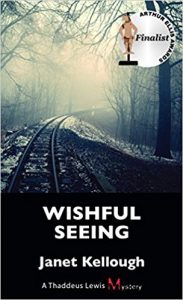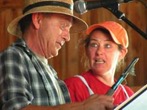Janet is currently celebrating the release of her new novel, the speculative fiction/thriller The Bathwater Conspiracy (EDGE Science Fiction and Fantasy Publishing 2018). Janet is best known as the author of six novels in The Thaddeus Lewis Mystery series, set in mid-19th century Upper Canada: On the Head of a Pin, Sowing Poison, 47 Sorrows, The Burying Ground, Wishful Seeing (short-listed for the 2017 Crime Writers of Canada Arthur Ellis Award for Best Novel) and The Heart Balm Tort. She has also written two contemporary novels, The Palace of the Moon and The Pear Shaped Woman, as well as the semi-non-fictional Legendary Guide to Prince Edward County and her new release The Bathwater Conspiracy. Also a storyteller, Janet has released two audio recordings, Swear On My Mother’s Grave and Fowke Tales Live at Lang. She lives in an old farmhouse in the middle of a red cedar fen in rural Ontario, Canada.
 The Bathwater Conspiracy is set in a dystopian post-apocalyptic future. What brings about the apocalypse?
The Bathwater Conspiracy is set in a dystopian post-apocalyptic future. What brings about the apocalypse?
A global influenza epidemic has swept across the planet. Researchers scramble to find a vaccine for it. They’re successful and huge populations are inoculated, but there’s a catch to it that no one anticipated – the vaccine is found to attack the Y chromosome in humans. By the time anyone realizes there is a problem, the vaccine has combined in an odd way with the virus it’s meant to eradicate, and the problematic vaccine spreads via the viral transmission. It’s a very Pandora’s Box/ Frankenstein scenario. It’s matter of opinion, really, whether the result is dystopian or not.
 What inspired you to write this novel?
What inspired you to write this novel?
The Bathwater Conspiracy really began with a discussion with fellow authors about how women are depicted in literature. I began toying with the idea of writing a story where all of the major characters are women, but I wanted to write about them without reference to their male relationships – a story about women interacting as real people and without the distortion of “the male mirror”. But at the same time, I didn’t want it to be a “chick book” either.
In the meantime, there were a number of particularly heinous crimes reported in the news, and one day I was really struck by how desensitized we’ve become to violence. We profess to be shocked by these violent acts, then we quickly forget about it and go on about our business until the next time – and there’s always a next time. I began speculating about how these brutal acts would be regarded in a society that had no experience of it. The two ideas kind of collided and I was off and running from there.
Listen to an excerpt from
The Bathwater Conspiracy
You have some technophobic religious fundamentalists living a blasted wasteland at the city’s edge. Tell us a bit of why you included them in the story.
If you write about real people, you’re going to find a wide range of personality, belief and opinion and I think that’s a very basic part of human nature. The Bathwater world is very diverse and very secular, and it doesn’t demand conformity of view. There is no “hive mind”. Not everybody wears the same uniform. I think there will always be people who find comfort in the certainty of religion and I don’t see why that would change in the future. Their inclusion really contributed to the depth of the Bathwater world. Besides, they provided a really convenient plot element!
 How was writing The Bathwater Conspiracy different from writing Wishful Seeing (short-listed for the 2017 Crime Writers of Canada Arthur Ellis Award for Best Novel)?
How was writing The Bathwater Conspiracy different from writing Wishful Seeing (short-listed for the 2017 Crime Writers of Canada Arthur Ellis Award for Best Novel)?
In many ways, they didn’t differ a great deal. I love the mystery/crime format because it’s a wonderful skeleton to hang all sorts of other things on. The Thaddeus Lewis series deals with mid-19th century Canadian history (I know – big yawn from way too many people) but the history is an integral part of the mystery and readers absorb the detail in the process of figuring out “whodunnit”.
The back story of The Bathwater Conspiracy is told as “history”. It’s an imagined history, but the process is the same. It becomes a basic element in the mystery and it allowed me to make the points I wanted to make, but because the thriller plot propels the story forward, the reader doesn’t get bogged down in the details.
The biggest difference was in the nature of the research. With the Thaddeus Lewis novels, I pore over old maps and read old documents. With Bathwater, I was suddenly reading weird scientific stuff like how cloning works and whether or not you can harvest sperm from a dead body. It was a brand new gig for me, but fortunately, the research skills I’ve honed with historical material kicked into gear and helped me find the information I needed.
For years you did performances as a storyteller with productions that featured a fusion of spoken word and music. What sort of music do you image would fit with The Bathwater Conspiracy?
As soon as I read this question, one song, in particular, popped into my head. My husband Rob was for many years co-owner of a live sound company (and yes, I always got a great deal on the sound for any of my shows). One of his favourite venues to work was a place called Stage Red, which is on Tyendinaga Mohawk Territory just to the north of us, where he was introduced to some really fabulous Aboriginal musicians. One artist he came across was Kinnie Starr who is billed as “hip-hop aggro-groove”. I can hear her song “Another’s Gone” rolling across the opening scenes of Bathwater. Here’s the video.
You worked on a production at Lang Pioneer Village featuring some stories from Prince Edward County. What are some of your favorite stories and why?
The show at Lang Pioneer Village dealt with the really rich musical heritage in Peterborough County, which was actually a departure for me. My stock in trade has always been stories from Prince Edward County and I’ve performed them in a bazillion different places.
One of my favourite performance stories concerns The Marysburgh Vortex, which is an area off the east coast of The County (we’re actually an island in Lake Ontario, so we talk about coasts). It’s been likened to The Bermuda Triangle, because there are an extraordinary number of strange incidents that have been reported from the area. There are over sixty documented shipwrecks, sailors report that their compasses are useless in the area, whole crews have disappeared. People have seen strange lights in the sky, UFO’s, mirages, you name it. But the fun thing about the Vortex is that locals have adopted it as the perfect excuse for any shortcomings and anything that has gone wrong. So I begin with the story of The Schooner Picton, which vanished in broad daylight in 1901. It’s a very strange, eerie, atmospheric story which usually gives the audience the shivers, then I switch things out and go right into the story of a poor woman who lost everything in the Vortex – garden tools, homework, first gear in her car and her husband, who was taken by the Vortex one night along with the family car and all the money in her savings account. “He said he was going to the store for a pack of cigarettes and I never saw him again.” It’s fun to do because of the juxtaposition between spooky and hilarious.
 When working on a novel, what are some of the processes you go through to get the story just right?
When working on a novel, what are some of the processes you go through to get the story just right?
Because I worked for so long combining music and story I pay particular attention to flow – how the scenes segue, how the story moves along without abrupt changes that take the reader out of the moment. I’m also particularly tuned in to dialogue and voice. Bathwater is written in first person and that made the protagonist, Carson MacHenry, a joy to write. She’s very slangy and irreverent and I would read a lot of her internal dialogue out loud, just to make sure that she was striking the right note. I talk to myself a lot. My family is used to it by now, so they don’t pay any attention anymore. Except the dog – the dog always listens.
What are some of your favorite authors?
I read so widely, it’s hard to come up with favourites. I read a huge amount of really dry non-fiction that few other people would find very interesting. I’m also co-organizer of Women Killing It Crime Writers’ Festival, so I read a lot of mysteries in connection with the authors we’ve booked – people like Vicki Delany, particularly her Constable Molly Smith series – Barbara Fradkin’s Inspector Green stories, R.M. Greenaway, who writes the B.C. Blues books.
In terms of SFF, I’m just about to launch into Arlene F. Marks’ Sic Transit Terra series and I really want to read Carrie Newberry’s Pick Your Teeth With My Bones because it’s such a great title.
I’ll read almost anything that tickles my fancy in some way without regard to genre, style or subject matter. I’m one of those people who will read the back of a cereal box if there’s nothing else available at the moment.

![]()
Published by Edge Science Fiction and Fantasy Publishing
Learn more about Janet Kellough
Website: Janet Kellough
Follower her on Facebook and Twitter

